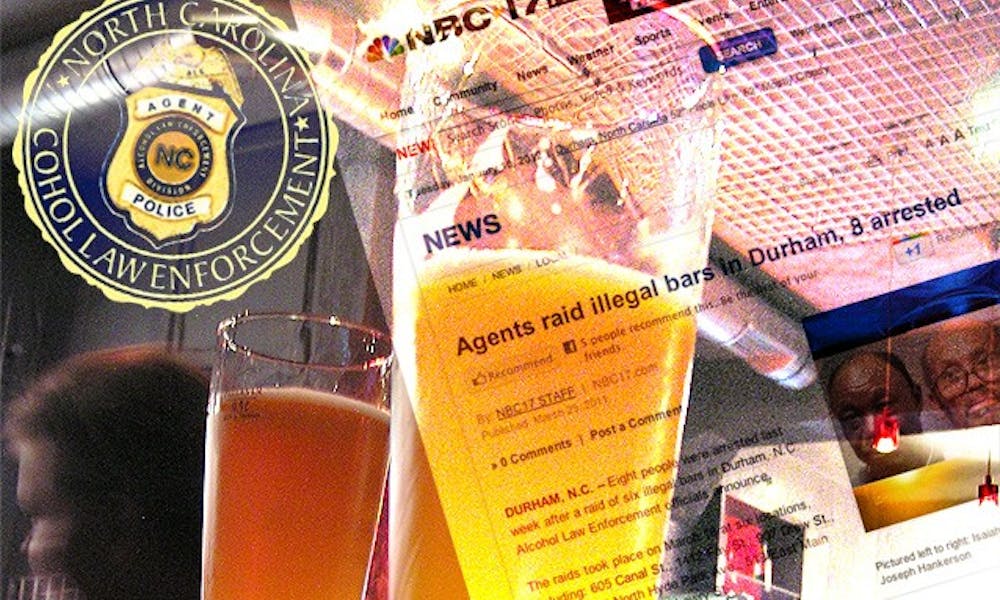When ALE comes to crash a party, the media may not be far behind.
Local media outlets can request to accompany Alcohol Law Enforcement officers during routine nightly operations. The ride-alongs are similar to the ones that other law enforcement agencies, such as the police, make available to the public. Last November, several students in Duke’s Alpha Epsilon Pi fraternity were cited for underage drinking at Mt. Fuji. Local station NBC-17 covered the incident in a Nov. 22 newscast titled, “Duke frat members charged in Durham ALE sting.” Although the video clip has since been removed from its website, NBC-17’s coverage of the incident raises questions about the ethical considerations of media outlets accompanying state agencies during routine operations.
Ride-alongs with law enforcement have been standard for years, Jonathan Carlson, a reporter at NBC-17 who covered the November sting, wrote in a Dec. 11 email.
“We were simply accompanying agents as they did their job,” Carlson said. “Filming news footage on public property is and has always been perfectly legal and ethical.... We showed our viewers exactly what happened when agents did their job.”
Carlson added that NBC-17’s coverage was not sensationalized. Jason Clough, executive producer of content at NBC-17, could not be reached for comment Dec. 10.
“ALE agents save lives by curtailing underage drinking, and we felt it would be informative to highlight what these state agents do,” Carlson said.
Carlson said NBC-17 requested to do a ride-along because the station felt the topic of underage drinking was timely and important as the days leading up to Thanksgiving are traditionally the most active for underage drinking.
Ken Rogerson, director of undergraduate studies for the Sanford School of Public Policy, declined to comment on NBC-17’s coverage of the incident, but said generally ride-alongs can be ethical because they are broadcasting actions that should be part of the public record.
“Every news organization has its own internal code of ethics,” Rogerson said. “ALE is a public institution so a lot of ALE’s activities should be public record. Whether [the media] ride-along has more to do with the organization’s policies. One of the reasons why there might be an issue is if there’s a minor involved.”
ALE’s operations may have contributed to the reduced number of alcohol violations off campus. In the last three academic years, the number of students cited for alcohol-related issues off campus decreased from 115 to 85 and then 81. A major emphasis of ALE—a division of the North Carolina Department of Crime Control and Public Safety—is protecting youth by enforcing underage drinking laws.
“As to why the statistics show a downward trend off-campus, my hypothesis is that students are more aware that... ALE, [Alcoholic Beverage Control] and Durham Police are patrolling the areas in which students socialize, and therefore students are being more careful about the decisions they make once they leave campus,” Christine Pesetski, assistant dean for off-campus and mediation services, wrote in a Jan. 6 email.
Jeff Lasater, special agent in charge for ALE in the Triangle Area, said ALE primarily focuses on investigating places with ABC permits like restaurants, bars and convenience stores. Agents routinely investigate places with alcohol permits in their assigned county two or three nights per week.
Lasater added that ALE does not typically conduct undercover operations on Duke’s campus, but it is something the agency could do at the University’s request.
Regarding ALE’s November sting, Lasater said some students were cited and have court dates, but nothing about the incident was out of the ordinary. The special agents went into Mt. Fuji because they saw some young people entering the location, but Lasater said it was a routine check.
NBC-17’s newscast of ALE’s November sting identified a student by name and showed several of the fraternity members’ faces. On his Facebook page, Carlson advertised the newscast as an “EXCLUSIVE” in which “students... placed under arrest... others... cited... accused of everything from threatening police... to underage drinking. We capture members of one of Duke University’s biggest fraternities... partying at a local bar.”
Vice President for Student Affairs Larry Moneta, who serves as advisor to Alpha Epsilon Pi, said Duke did not intervene in any way following the incident other than the Office of Student Conduct’s set procedures.
“All the Duke students were cooperative that night. ALE did not have problems at Mt. Fuji. Everyone was nice and cooperative and polite,” Lasater said.
Get The Chronicle straight to your inbox
Signup for our weekly newsletter. Cancel at any time.

